What a disturbing end to the season!
Law & Order Season 22 Episode 22 featured Sam Waterson’s real-life daughter as McCoy’s estranged daughter Rebecca, who took it personally when her father put ethical concerns over helping her with a case.
The case itself brought up questions that don’t have answers, some of which may keep fans talking all summer long.
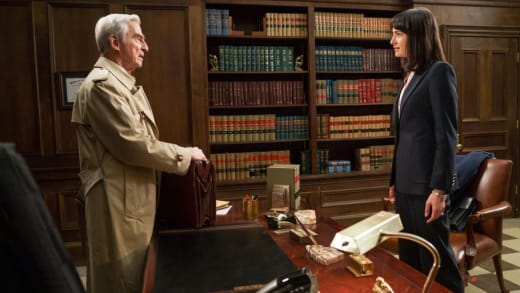
This was also Sam Waterson’s 400th episode of Law & Order, which is no small feat. Congratulations to the veteran actor on reaching this milestone; the story he was given was certainly worthy of him!
McCoy reminded me of Blue Bloods’ Frank Reagan throughout the second half of the hour. Like Frank, he refused to bend the rules for family members who shared his profession, leaving Rebecca feeling slighted.
McCoy was right that he couldn’t give his daughter special treatment, even if she resented it. As a defense attorney, she should understand that.
Would she think it was fair if a prosecutor got special treatment from the court because they were the child of a judge or DA? Of course not. So why should she expect it from her father?
There are unresolved issues that have nothing to do with this case, and that’s what Rebecca was furious about. She felt her father always put principles over love and empathy — that attitude wasn’t created overnight.
Price: Since your daughter is representing the defendant, I was wondering how you want to handle the process of this case.
McCoy: I love my daughter dearly, but this is just another case and she is just another defense attorney.
Rebecca’s insistence that empathy meant giving Derek Quinn a free pass irked me.
The question of what to do with a trauma victim who becomes a shooter is complex, and Law & Order did an excellent job showing that. However, I didn’t like the PTSD-as-an-excuse trope.
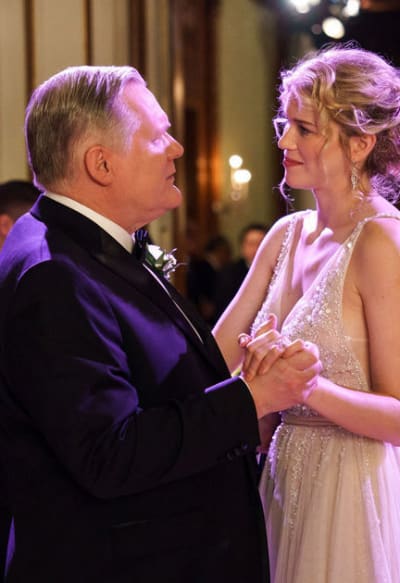
People with mental health issues — including PTSD — are far more likely to be victims of crimes than perpetrators, yet television often suggests that they are all violent and dangerous. PTSD tends to be especially misrepresented.
The myths and misinformation surrounding this disorder are dangerous; they can make people scared and ashamed to ask for help or cause people to shun friends and relatives who are suffering.
Law & Order generally does an excellent job of combatting those stereotypes. Still, the suggestion that a person with severe PTSD couldn’t help planning a murder and carrying it out was deeply problematic.
This claim did exactly what McCoy said should not happen: it gave Derek a pass on pre-meditated murder because he’d been a victim in the past.

It also sets a dangerous precedent. If one person gets a pass because of PTSD, others might try it too. Do we want to live in a society where people can act violently without consequences because of what has been done to them in the past?
Rebecca wasn’t wholly wrong. Jail doesn’t seem like the correct answer for Derek’s crimes. Derek won’t get the mental health treatment he needs in prison and will likely suffer further trauma from all the violence he may witness or endure there.
He’s not a hardened criminal and is unstable — he ran from police and then threatened to shoot himself while shouting that gun violence needs to end.
Still, that doesn’t and shouldn’t be an excuse for his violent crime. Nor does it make him exceptional among prisoners, many of whom have untreated mental health issues.
If Rebecca wanted to work toward ending the practice of prisons becoming de facto mental hospitals where patients get punishment rather than treatment, I’d support that. But that won’t be achieved by pleading insanity every time someone who was once a victim becomes a criminal.
Derek’s behavior didn’t make any sense, which is probably the best argument for his insanity plea.
How does shooting to kill a Senator who voted against gun control help solve the problem of too much gun violence in this country? It makes a political statement but will not resonate with many people.
Those against gun control might argue that more firearms at the wedding might have stopped Derek before he started. His claims at the scene of his arrest and trial can be turned into sound bytes that conservative media will play over and over as evidence that those who want gun control laws are the ones who are truly violent.
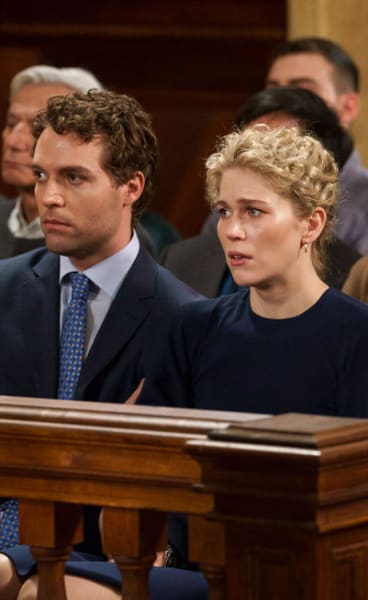
Now a woman has lost her father, and her wedding day will be one to remember but for all the wrong reasons.
Price’s PTSD reaction outside the courtroom was one of the most powerful scenes of the hour. It also proved that PTSD is not an excuse for violence.
Price saw a guy pulling a phone out of his pocket and panicked, but he didn’t grab a gun and shoot him.
The psychiatrist who testified was right that PTSD triggers can happen at random times — Price’s behavior proved that. But if anything, that means PTSD and guns may not be a good combination; it is still not an excuse for a person with PTSD to pull the trigger.
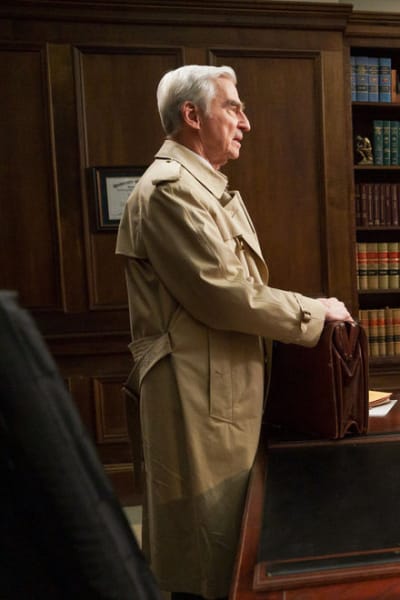
As for Price’s attempt to make a deal, doesn’t Rebecca have to offer it to Derek even if she knows he’ll reject it?
At the very least, keeping your clients from knowing about a potential plea deal on the table is unethical.
Derek might not have been happy about the deal, but Rebecca probably could have convinced him it was the best outcome. Now Derek’s lost at trial, has a murder conviction on his record and will likely do more time than he would have if he’d taken the deal.
Sentencing seems a more appropriate place to bring up concerns about Derek’s mental health, though, so maybe Rebecca can get him a fairer sentence than life in prison.

Your turn, Law & Order fanatics. Hit the big, blue SHOW COMMENTS button and let us know your thoughts.
Don’t forget you can watch Law & Order online whenever you’d like.
Law & Order airs on NBC on Thursdays at 8 PM EST / PST. It has been renewed for the 2023-2024 season.
Jack Ori is a senior staff writer for TV Fanatic. His debut young adult novel, Reinventing Hannah, is available on Amazon. Follow him on Twitter.


























































![Mason Ramsey – Twang [Official Music Video] Mason Ramsey – Twang [Official Music Video]](https://i.ytimg.com/vi/xwe8F_AhLY0/maxresdefault.jpg)











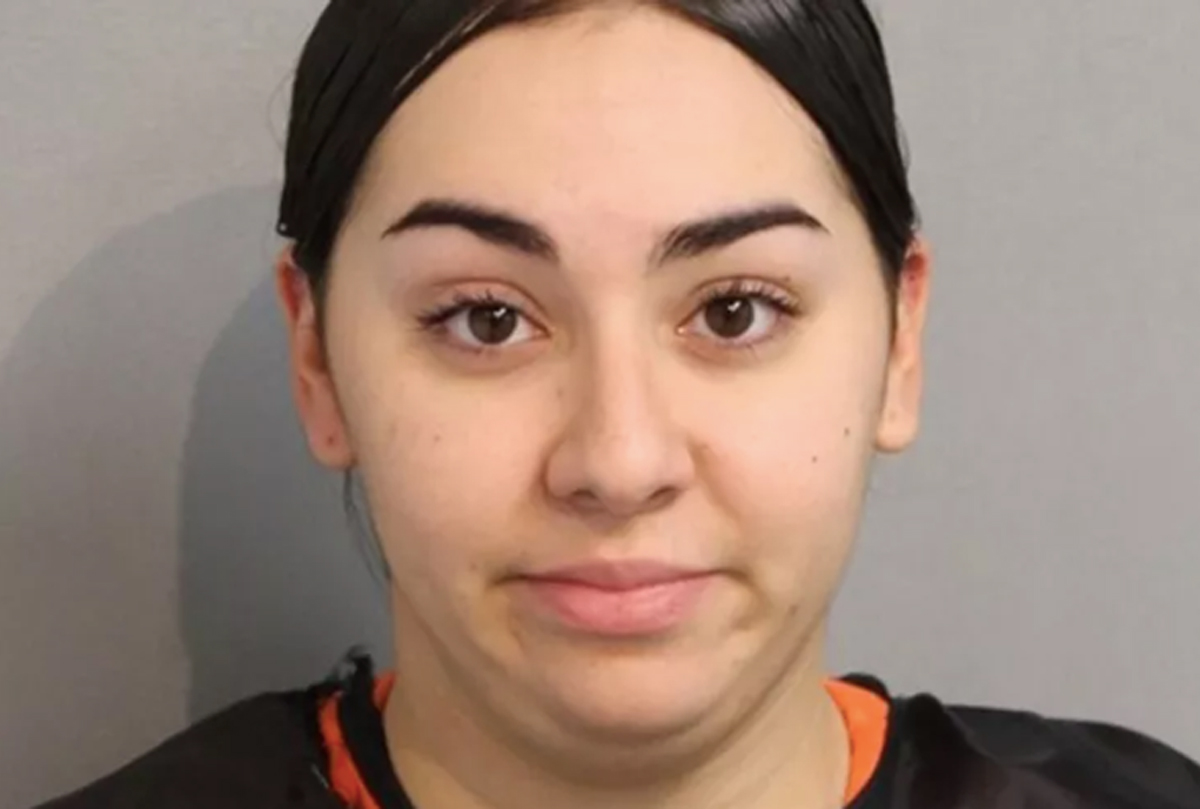



:quality(85):upscale()/2024/07/22/900/n/1922564/18093faa669ec2c5e62612.56204074_.png)





